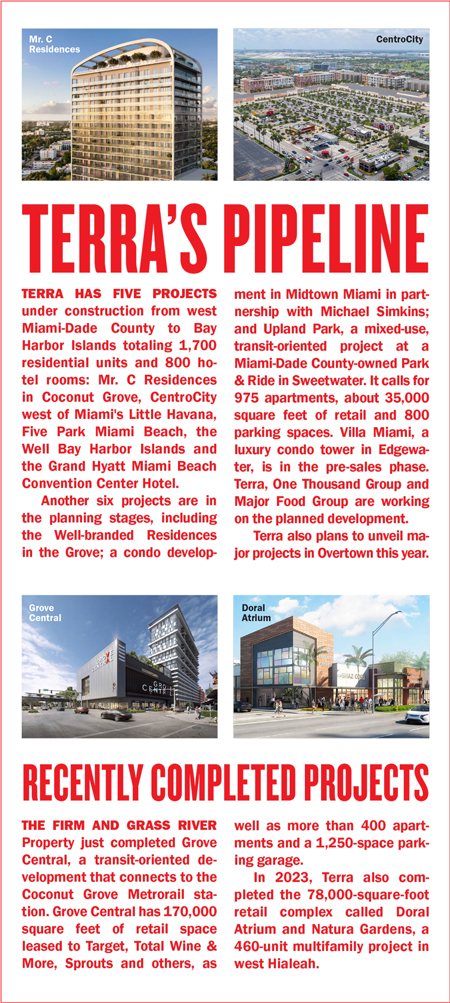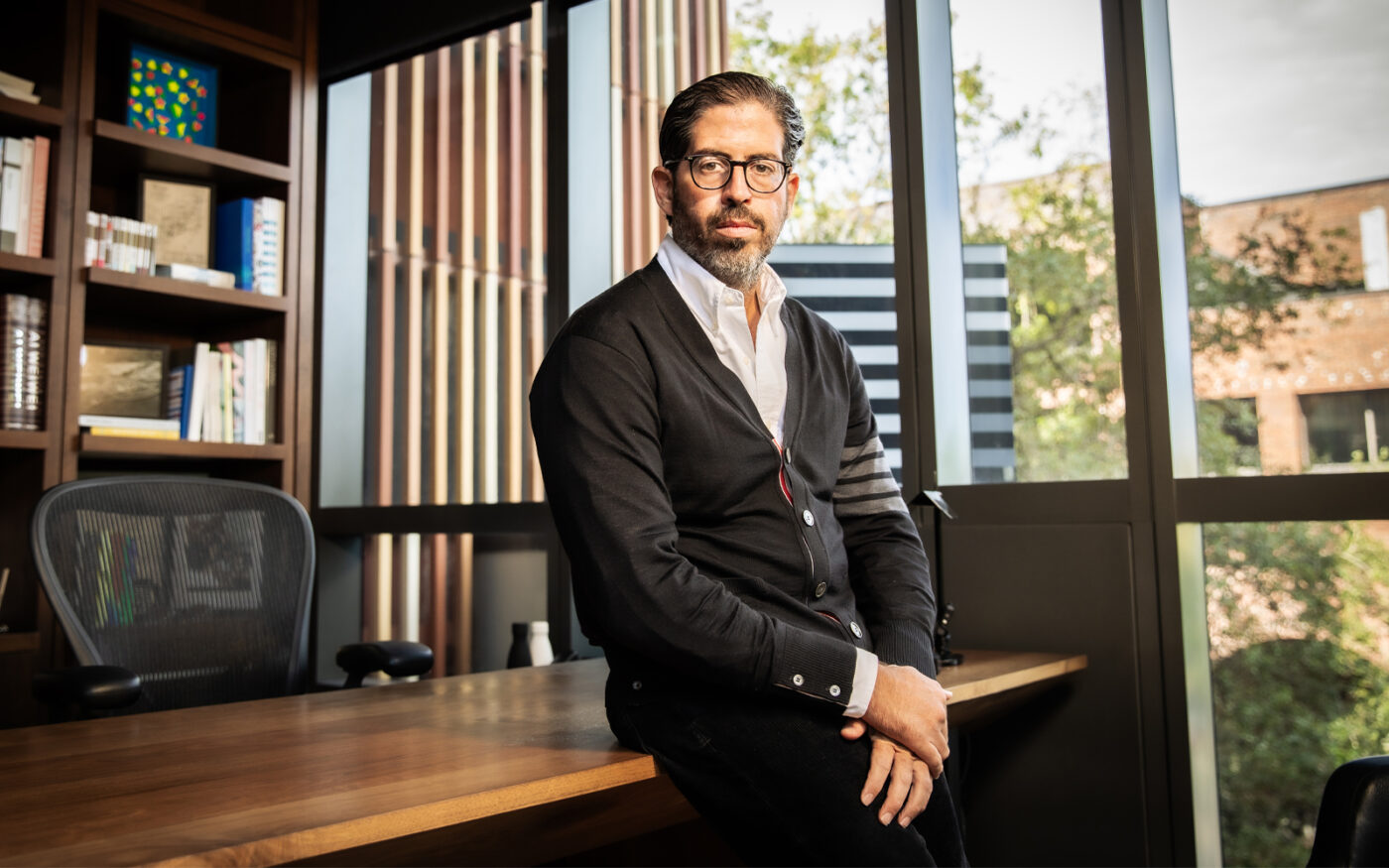Developer David Martin is good at a lot of things. Time management, however, is something he’s still working on.
During an interview with The Real Deal, Martin took a conference call from Douglas Elliman Florida CEO Jay Parker and four others. Elliman needed to have its commissions paid before the end of the year. “Get that processed fast,” Martin urged an employee.
Moments later, Martin’s assistant Bailey appeared. Someone was waiting upstairs to meet with Martin, who had told him to come at that time.
“Sorry,” he said. We laugh. It’s not uncommon for 46-year-old Martin to be double- or triple-booked. The interview was a follow-up, scheduled because he had to step out of a previous interview to speak with a “capital guy” for a quick 10-minute call that wound up lasting 90 minutes.
Martin has become one of the biggest and most in-demand developers in South Florida, competing with the Related Group and other giants. His firm Terra has about a dozen developments in the pipeline with retail, office, hotels, condos and apartments. More than 3,000 residential units are in the planning stage or under construction. Terra also is co-developing the 800-room Miami Beach convention center hotel with Jackie Soffer and partners.
Terra has expanded since Martin founded it in 2001, but he is still very much involved in the day-to-day operations and deals, from start to finish. This is true even as he embarks on some of the toughest projects of his career, at a time when developers are scrambling to weather distress and other economic headwinds.
He’s keeping a close eye on market conditions and adjusting his playbook on the fly.
“[To be] a better coach, you want to be seeing the data and intelligence — whether it’s in the construction phase, the marketing phase, the design phase, you want to really feel what’s happening in order to be able to adapt and be first, and predict and anticipate,” he said. “My entire life is to anticipate, and we try to preach that here.”
Martin’s matrix
Martin said he began to “institutionalize” the company shortly after the Great Recession. Terra started as a residential developer. His dad, former Greenberg Traurig attorney Pedro Martin, co-founded Terra and still has a financial interest in the firm.
The younger Martin, a Coconut Grove native, is best known for his projects in the Miami neighborhood, which is in the midst of a renaissance.
Terra’s sleek Coconut Grove headquarters is in a former Miami Parking Authority garage the company partially converted, an upgrade from its former home in the Grand Bay office condo building nearby. It’s kind of like David Martin 2.0, whose uniform includes Thom Browne Oxford shirts ($343) and cardigans (about $1,000). Black designer glasses complement his slicked-back hair and salt-and-pepper beard.
The new office is Wall Street-meets-James Bond. A spiral staircase leads you to an open floor plan where analysts are busy scrutinizing Terra’s portfolios. Large TVs are set up fronting a conference table and tuned to MSNBC or CNBC on mute — if the screens aren’t in use for a meeting or presentation. A bookshelf doubles as a secret exit door.
“My entire life is to anticipate, and we try to preach that here.”
The office overlooks the firm’s future mixed-use condo project across the street from Sadelle’s restaurant, the latter of which is part of the Park Grove luxury condo complex he developed in partnership with condo giant Jorge Pérez. Not too far in the distance is Grove at Grand Bay, Martin’s twisty Bjarke Ingels-designed condo towers that marked the developer’s first major project in the neighborhood.
The planned mixed-use condo catty-corner from his office will be his second Well-branded project. Like the name suggests, it’s heavy on wellness. The Well in Bay Harbor Islands, which is under construction, will include condos, office space, food and beverage concepts, a rooftop and fitness and wellness amenities. It’s more than 50 percent pre-sold.
Under Martin’s direction, Terra has also expanded to Doral, Miami Beach, Pembroke Pines, West Palm Beach, Miami’s Overtown and Hialeah, to name a few places. His project-specific partners include, in addition to Soffer, developers Michael Simkins, Russell Galbut, Masoud Shojaee and Grass River Property. In Miami’s Edgewater, he is partnering with the developers of One Thousand Museum and the hospitality group Major Food Group (owner of Sadelle’s) on a planned waterfront condo tower called Villa Miami.
If a development site is in Miami-Dade, Broward or Palm Beach counties, and is of a certain size, Martin’s firm is a potential player.
The pandemic supercharged Terra’s growth, as it did for other South Florida developers, brokerages and investors.
Terra’s Mr. C-branded two-tower development in Coconut Grove, for example, sold so quickly that Martin converted plans for the second building into condos instead of rentals. It’s nearly completed. Another Mr. C is now planned in West Palm Beach in partnership with the Morrison family.
But it hasn’t been all smooth sailing.
In June 2021, Champlain Towers South collapsed overnight, killing 98 people. A development group led by Terra built the tower next door, called Eighty Seven Park. The development team was sued as part of a class action case brought by the victims’ families and survivors of the tragedy, who alleged that construction of Eighty Seven Park caused the collapse. The insurer for the Terra-led development team kicked in $28 million to the $1 billion-plus settlement, without admitting liability. Insurers for other companies involved in Eighty Seven Park contributed nearly $80 million to the settlement.
Martin is careful when he addresses the collapse, likely because he knows that his comments will be picked apart, and because he does not want to detract from the calamity.

“That experience is something that will be with me for the rest of my life,” he said.
Martin has been around death since he was a child: His family owns Bernardo Garcia Funeral Homes. That provided him a perspective that others may not have, or may not gain until later in life.
It may help explain why Martin doesn’t want to waste time. He recalled recently being honored at an event.
“I was just listening to the things they were saying about me. It’s cool, but it’s like, ‘How do we work together and do something?’” he said. “‘Get to the point.’”
Driving force
Martin is good at assembling teams, often pairing architects with the right sites, like tapping Ingels to design Grove at Grand Bay.
“There’s a whole pre-assessment that he does that not necessarily all developers do,” said Iris Escarra, a prominent land use attorney at Greenberg Traurig. “Then he tries to get different innovative architects to look at it and give him ideas.”
Some describe Martin as passionate and magnetic — others say obsessive and intense.
Escarra compared working with him to being part of the family in the “Fast and Furious” franchise.
“They’re all lined up with their own special car, everyone has their own contribution to the mix. It’s exciting, your adrenaline rushes,” Escarra said. “That’s sort of the environment he creates.”
But some deals don’t always go as planned.
Last spring, in what would have been the biggest development site purchase and project of his career, Martin entered into contract to acquire Genting Group’s 15.5-acre assemblage in downtown Miami’s Arts & Entertainment District for $1.2 billion. The deal would have set a record as one of the most expensive urban land sales in the country, and news of the contract boosted confidence in the South Florida market when lenders were pulling out and deals were falling apart.
But the purchase was called off in June. The Martin-led group sought amendments to which Genting wouldn’t agree.
Martin kept the door open, though it increasingly sounds like he will not be the buyer.
“I’m always going to consider that site, and I’ll always want to develop that site,” he said.
In another setback, three years ago Miami Beach voters narrowly rejected Terra’s proposal to redevelop the Miami Beach Marina, but they did approve a long-term lease and upgrades to the marina. Martin still claimed victory, determined to work with the city to move forward.
“One of his main attributes, especially when dealing with government, is listening to what the other side needs, and trying to get them what they need,” said Bilzin Sumberg attorney Suzanne Amaducci, who heads the Miami law firm’s real estate practice.
“What comes through in his negotiations is that he cares, which is something you are not going to get with an institutional investor.”
Yet not everyone wants to work with him. Over the summer, Martin sent offers to owners at Amethyst, an older oceanfront Miami Beach condo building that’s at the center of a drawn-out and litigious buyout with Mast Capital. Martin said he was open to working with Mast, which is led by Camilo Miguel Jr. Terra doesn’t appear to be moving forward there.
Martin is also negotiating with owners at Castle Beach Club, another aging but much larger condo building that sits on 4 acres of oceanfront land in Miami Beach. He is seeking to complete a bulk purchase that would total or exceed half a billion dollars. If it closes in November, it would mark the priciest buyout and a huge feat, considering the complexity and challenges that come with buyout purchases.
Terra stepped into Castle Beach after a similar deal with Related Group and 13th Floor Investments at the property fell apart. Martin said he’s hopeful that he’ll close the deal.
“Let’s say you have something that’s worth $100, and someone offers you $200. But the fact that everybody else is getting $200, ‘Now I want to get more, I want to get $250,’” he said. “When you’re working with 300-something owners, imagine the sampling of people and motivations.”
Some owners are concerned with the long timeline. Following the Surfside collapse, state lawmakers passed legislation that forces associations to fully fund their reserve accounts and make necessary repairs. The clock is ticking.
If Martin does acquire the property, terminate the association, knock the building down and construct something new, he would be able to charge a premium. That’s because of the site’s massive width on the ocean, which would likely offer all buyers ocean views.
“There’s a big difference in price” between ocean, city and Intracoastal views in Miami Beach, he said.
The pressure is also on for Martin and his partners to secure construction financing for the Grand Hyatt Miami Beach Convention Center Hotel. Vertical construction of the 17-story hotel has been delayed, and the renovated convention center has missed out on major conferences as a result. Voters approved the project in 2019.
“It’s a necessary project,” he said. “We have this presentation of all the lost conventions that we’ve had without this hotel, and it’s pretty crazy.”
In a required update to the City Commission, the development team said in November that it needed additional time to secure 12 percent of the financing for the $600 million project, and was delaying possession of the property as a result.
Martin said he expects to close on a roughly $400 million loan for the project in the first or second quarter.
Terra also plans to unveil two mixed-use developments that could help transform Overtown, the oldest Black neighborhood in Miami. His aim is to include neighborhood businesses and job training for residents of the community.
Talking with Martin, you get the sense that he could be a successful politician. He touts community engagement and sustainability, even when it’s not a requirement for a project.
“How do we get solution-oriented thinking within our government, within our communities? Rather than just criticizing or critiquing things, we need to solve things, and take some risks and tests,” he said, “whether they worked or not, and learn from them and make smarter decisions next time.”
His intensity is on display.
“I enjoy finding solutions to problems that others couldn’t find. I love that,” he said.
But would he ever run for office?
“No.”
